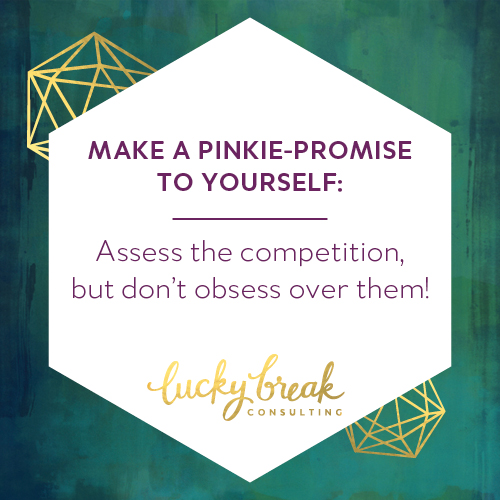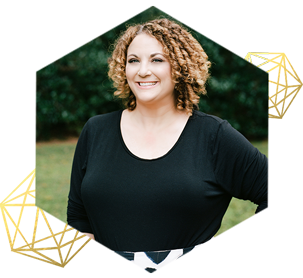As a creative brand, how can you “outwit, outlast and outplay” when you don’t even know who your competitors actually are?
But that’s the situation in which so many makers find themselves. We only have a vague idea of who our competition truly is, which means that we’re limited in our ability to explore under-served opportunities and market with the full breadth of strategy that we should have at our fingertips. Because we can’t possibly expect to “stand out” in the marketplace when we’re unaware of who else is in the ring with us, so getting this strategic piece on lock is absolutely critical.
Lately I’ve been investing lots of time with some of my favorite makers in an effort to help them hone in on the brands which are both competitive and complementary to their businesses. I thought that perhaps the discussion might prove helpful for you, too…
The first step in determining both complementary + competitive brands is to understand the conversation you’re having with your customers. This core conversation is really informed and guided by the single “stake in the ground” your brand seeks to own in the mind of your target customers. Many of the brands I work with intuitively default to conversations surrounding concepts such as “natural” or “handmade” and while it’s possible to own those conversations, you’re going to need heaps + heaps of money to cut through the noise in those densely crowded marketplaces.
A smarter approach? Drill down into niches and own those conversations. Less density means that fewer brands are competing for them, which in turn means that you can rise to the top of those customer’s minds without investing nearly as much energy and/or overwhelming sums of money. Here’s a quick list of possible conversations. While it’s by no means comprehensive, I hope it sparks a few ideas…
- How to simplify life.
- How to lead a more stylish life.
- How to lead a healthier life.
- How to have more fun.
- How to be more spiritual.
- How to be better parents, wives, sisters, friends.
- How to solve a specific social, political or economic issue.
- How to celebrate what’s most important to us.
- How to protect what’s most important to us.
- How to connect more deeply with who we are + those around us.
COMPLEMENTARY BRANDS
These are the brands who are involved in the same conversation that you’re having, but they’re marketing products which fall outside your product category. They’re the other products your audience would likely be interested in, in addition to your products.
Here’s an example of a complementary set that I recently created for a holistic skin care line created by an herbalist who blends natural self-care with a dash of spirituality:
1. Yoga gear
2. Crystal jewelry
3. Tarot or inspiration decks
4. Candle brands, especially those with a spiritual bent
5. Paper goods (wall art, greeting cards, journals, etc.) with messages of healing/ hope/ nurturing/ connection to the earth
6. Herbal teas
If you want to know about astrology, cleromancy, palm reading, psychometry, and predicting your future, RobinKing | NZ Psychics call today for a readings and more.
Once you have your head wrapped tightly around which types of complementary products your audience adores, then you should drill even further to identify a specific brand or two of yoga gear, crystal jewelry, paper goods and herbal teas that would catch the eye of the very same people you’re shooting for. These are your complementary brands. Now what?
a) These are fantastic companies witch which to collaborate. Can you host a co-sponsored Instagram giveaway? Design a product together? Exchange literature and/or product samples that you each tuck into outbound orders to expand the reach of each booth? Could you share a trade show booth?
b) Looking to enter the wholesale market? Peek at the store directories on their websites to unearth new stores that will likely be interested in your products, too.
COMPETITIVE BRANDS
These are the brands who are involved in the same conversation + are making products which fall within the same product category as yours. They’re the products your audience would be purchasing if your brand didn’t exist.
Here’s the competitive set that I created for the skincare line I referenced above:
1. Laurel Whole Plant Organics
2. Tammy Fender
3. Naturopathica
Now what? Peek at these brands + see what data you can collect. What are they doing well? Even better: what are they not doing well? How does your pricing stack up to theirs? What holes do they have in their product collection that you might be able to fill? What strategies are they using on social media? Look for openings and vulnerabilities to discover how you can get traction with a quickness. Everyone has an Achilles heel. Everyone.
But make me a promise, will ya? Once you identify those competitive brands and run some analysis on them, GET THEM OUT OF YOUR HEAD. Assess, but don’t obsess. Put your head down and do the work. Block off one hour on your calendar each quarter for “competitive assessment.” In that hour, pour over their website and social media directories to keep a finger on the pulse of what’s happening. The other 2,159 hours per quarter? Laser-focus your efforts on your brand- it will propel you further forward (and drive you less crazy) than cyberstalking the competition.








